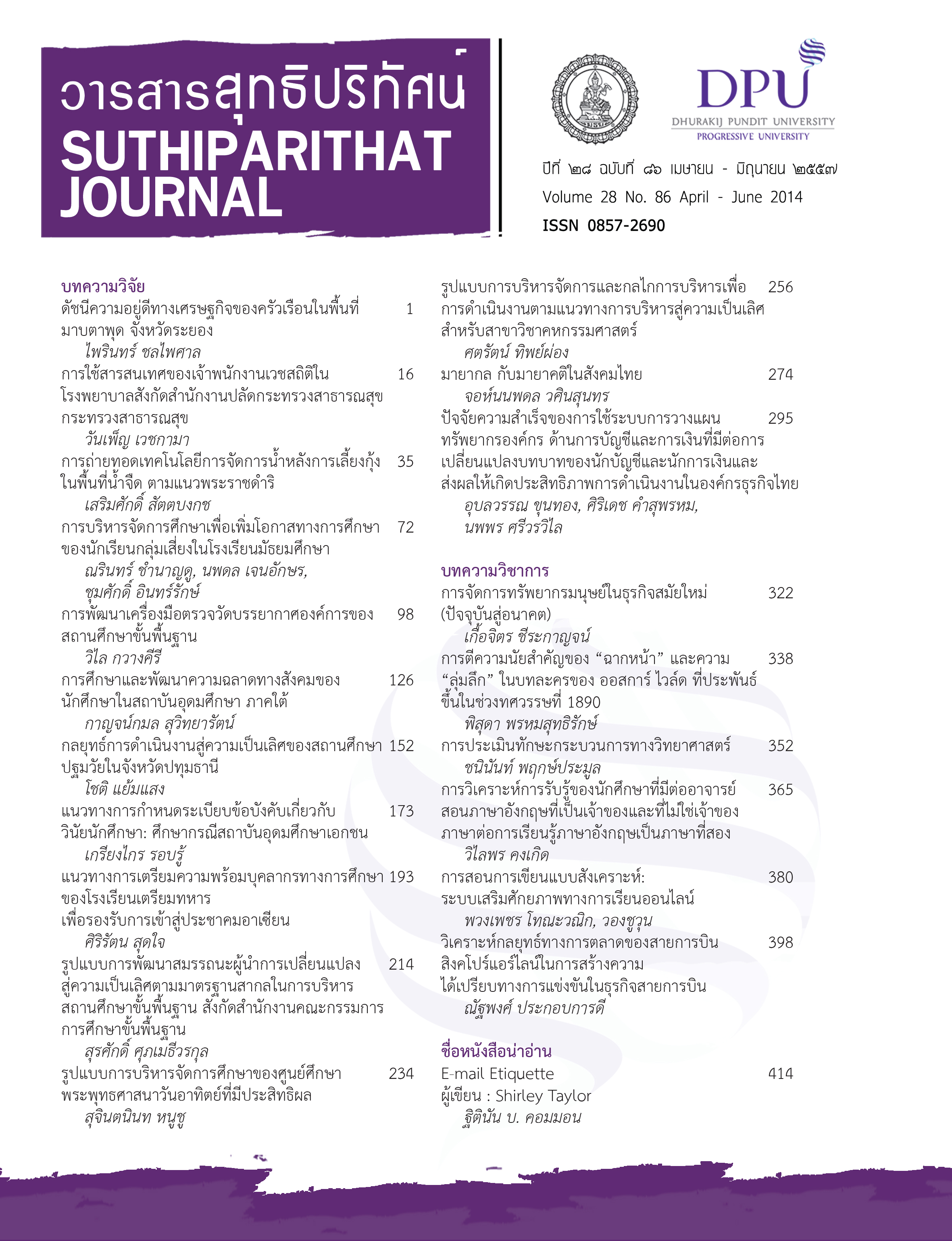การวิเคราะห์การรับรู้ของนักศึกษาที่มีต่ออาจารย์สอนภาษาอังกฤษที่เป็นเจ้าของและที่ไม่ใช่เจ้าของภาษาต่อการเรียนรู้ภาษาอังกฤษเป็นภาษาที่สอง
คำสำคัญ:
ครูสอนภาษาอังกฤษที่เป็นเจ้าของภาษา, ครูสอนภาษาอังกฤษที่ไม่ใช่เจ้าของภาษา, การรับรู้ของนักเรียนบทคัดย่อ
เนื่องจากบทบาทที่เพิ่มขึ้นของภาษาอังกฤษในฐานะภาษาที่ใช้ในการสื่อสารสากล ดังนั้นความต้องการครูสอนภาษาอังกฤษที่เป็นเจ้าของภาษาที่มีมากขึ้นในหลายๆ ประเทศจึงเป็นสิ่งที่หลีกเลี่ยงไม่ได้ ทั้งนี้เนื่องจากผู้เรียนภาษาจำนวนมากมีความเชื่อว่า ครูผู้เป็นเจ้าของภาษาเป็นผู้ที่สามารถให้ความรู้แก่นักศึกษาได้เป็นอย่างดี เนื่องจากพวกเขาเหล่านี้มีความคล่องแคล่วในการใช้ภาษาของตนเอง ในทางตรงกันข้ามผู้เรียนเป็นจำนวนมากมองว่าครูสอนภาษาอังกฤษที่ไม่ใช่เจ้าของภาษามีความสามารถในการสอน ภาษาอังกฤษที่ด้อยกว่า บทความนี้จึงนำเสนอการวิเคราะห์การรับรู้ของนักศึกษาที่มีต่อครูภาษาอังกฤษ ทั้งที่เป็นเจ้าของภาษาและไม่ใช่เจ้าของภาษาจากผลการวิจัยต่างๆ ในด้านของวัฒนธรรม วิธีการสอนและการประเมินผล ความสามารถทางภาษาอังกฤษ รวมไปถึงการวิเคราะห์ผลของการรับรู้เหล่านี้ที่มีผลต่อการเรียนของนักศึกษาในด้านต่างๆด้วย และในตอนท้ายบทความนี้ได้เสนอแนะแนวคิดการจ้างครูสอนภาษาอังกฤษว่า ไม่ควรพิจารณาความเป็นเจ้าของภาษามากจนเกินไปในการจ้างครู แต่ควรพิจารณาจ้างครูที่มีคุณสมบัติเหมาะสมที่สามารถให้ความรู้แก่นักศึกษาอย่างเพียงพอสำหรับการสื่อสารระหว่างวัฒนธรรมได้อย่างประสบความสำเร็จ เป็นสำคัญ
เอกสารอ้างอิง
Alptekin, C. (1992). Target-language culture in EFL materials. ELT Journal, 47(2), pp. 136-143.
Arva, V. & Medgyes, P. (2000). Native and nonnative teachers in the classroom. System, 28(3), pp.355–372.
Butler, G. Y. (2007). How are non native-English-Speaking teachers perceived by young learners? TESOL Quarterly, 41(4), pp.731-755.
Byram, M. & Fleming, M. eds. (1998). Language learning in intercultural perspective. Cambridge: Cambridge University Press.
Coleman, A. J. (1995). Evolving intercultural perceptions among university language learner in Europe. In: M. Byram, and M., Fleming, ed. 1998. Language learning in intercultural perspective. Cambridge: Cambridge University Press. pp.45-75.
Faez, F. (2011). Reconceptualizing the native/nonnative speaker dichotomy, Journal of Language, Identity & Education, 10(4), pp. 231-249.
Grubbs, J. S., Jantarach, V. & Kettem, S. (2010). Studying English with Thai and nativespeaking teachers. Teachers and Teaching, 16(5), pp. 559-576.
Jæger, K. (2006). The intercultural speaker and present-day requirements regarding linguistic and culturalcompetence, [online] Available at:<http://inet.dpb.dpu.dk/infodok/sprogforum/Espr19/Jager.pdf> [Accessed 16 January 2012]. p.56.
Jin, L., & Cortazzi, M. (1995). The culture and the learner brings: a bridge or a barrier? In: M. Byram, and M., Fleming, ed. 1998. Language learning in intercultural perspective. Cambridge: Cambridge University Press. pp. 98-118.
Kramsch, C. (1995). The privilege of the intercultural speaker. In: M. Byram, and M., Fleming, ed. 1998. Language learning in intercultural perspective. Cambridge: Cambridge University Press. p. 20.
Lasagabaster, D. & Sierra, M.J. (2002). University students’ perceptions of native and nonnative speaker teachers of English. Language Awareness, 11(2), pp. 132-142 .
Medgyes, P. (1991). Native or non-native: who is worth more?. Oxford Journal, 46(4), pp. 340-349.
Medgyes, P. (1994). The non-native teacher. London: Macmillian. p.10
Medgyes, P. (2001). When the teacher is a non-native speaker. In: M, Celce-Murcia. ed.2001. Teaching English as a second or foreign language, 3rd ed. Boston: Heinle and Heinle. p. 430.
Myers, J. (2006). Constructing EFL learners as intercultural speakers through digital technologies. In: (Kookmin University), 60th Anniversary conference: new trends in English teaching in the globalized age. Seoul, Kookmin University 20 October 2006. Seoul: Kookmin University. p.2.
Phothongsunan, S. & Suwanarak, K. (2008). Native and Non-Native Dichotomy: Distinctive Stances of Thai Teachers of English. ABAC Journal, 28(2), pp. 10-30.
Prommee, B. (2010). Intercultural communication problems in the classroom situation of MBIC students at KMUTNB. M.A. King Mongkut’ s University of Technology North Bangkok.
Rao, Z. (2010). Chinese students’ perceptions of native English-speaking teachers in EFL teaching. Journal of Multilingual and Multicultural Development, 31(1), pp.55-68.
Sheorey, R. (1986). Error perceptions of native speaking and non-native speaking teachers of ESL. ELT Journal, 40(4), pp. 306-312.
ดาวน์โหลด
เผยแพร่แล้ว
รูปแบบการอ้างอิง
ฉบับ
ประเภทบทความ
สัญญาอนุญาต
เนื้อหาและข้อมูลในบทความที่ลงตีพิมพ์ในวารสารสุทธิปริทัศน์ ถือเป็นข้อคิดเห็นและความรับผิดชอบของผู้เขียนบทความโดยตรงซึ่งกองบรรณาธิการวารสาร ไม่จำเป็นต้องเห็นด้วย หรือร่วมรับผิดชอบใด ๆ
บทความ ข้อมูล เนื้อหา รูปภาพ ฯลฯ ที่ได้รับการตีพิมพ์ในวารสารสุทธิปริทัศน์ ถือเป็นลิขสิทธิ์ของวารสารสุทธิปริทัศน์หากบุคคลหรือหน่วยงานใดต้องการนำทั้งหมดหรือส่วนหนึ่งส่วนใดไปเผยแพร่ต่อหรือเพื่อกระทำการใด ๆ จะต้องได้รับอนุญาตเป็นลายลักษณ์อักษรจากวารสารสุทธิปริทัศน์ก่อนเท่านั้น







